Building a Resilient Kinderland: A Practical Guide to Business Continuity Management
[Business Impact Analysis] [Critical Business Function] [6]
Business Impact Analysis Questionnaires [Part 1 and 2]
Human Resources and Staff Scheduling
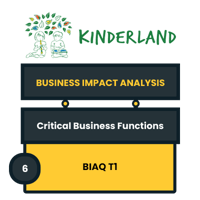 Kinderland Singapore’s operational resilience hinges on its ability to maintain seamless Human Resources (HR) and Staff Scheduling functions in the dynamic landscape of childcare services.
Kinderland Singapore’s operational resilience hinges on its ability to maintain seamless Human Resources (HR) and Staff Scheduling functions in the dynamic landscape of childcare services.
These functions are pivotal for delivering high-quality early childhood education and adhering to stringent regulatory standards set by Singapore’s Early Childhood Development Agency (ECDA).
Author's Comment: The first two parts (Part 1 to Part 2 of six parts) of the BIAQ submission are extracted from the BCM Institute's Business Impact Analysis Questionnaires (BIAQ). Participants are expected to complete the six parts of the BIAQ as part of the assignment during the BCM-5000 ISO 22301 BCMS Expert Implementer Course.
This chapter presents a dual analysis to fortify Kinderland’s business continuity strategy:
-
Part 1: Critical Business Functions (CBF) for HR and Staff Scheduling
This framework identifies and codifies core HR processes—workforce deployment, compliance management, and staff training—that are indispensable for sustaining operations. Each CBF is paired with its Minimum Business Continuity Objective (MBCO), which defines the baseline service level required during disruptions to avoid operational collapse. -
Part 2: Impact Analysis of Critical Business Functions
Building on the CBFs, this assessment evaluates disruptions' financial, operational, and reputational consequences. It highlights vulnerabilities like regulatory penalties for non-compliance or service degradation due to staffing shortages, offering actionable insights for prioritising continuity efforts.
By aligning with BCMpedia’s methodologies, this chapter equips Kinderland to transform HR from a support function into a strategic pillar of resilience, ensuring uninterrupted care for children and trust among stakeholders.
Here is a structured table of Critical Business Functions (CBF) for Kinderland Singapore's HR and Staff Scheduling, incorporating the requested headers and referencing relevant definitions from the search results:
Part 1: Critical Business Functions (CBF) for HR and Staff Scheduling
|
Critical Business Functions (CBF) |
CBF Code |
Description of CBF |
Business Unit Minimum Business Continuity Objective (MBCO) |
|
Staff Recruitment & Qualification Maintenance |
HR-01 |
Ensures continuous hiring of qualified educators and compliance with ECDA regulations. |
Maintain a pipeline of pre-vetted candidates to fill vacancies within 7 days to meet ECDA-mandated staff-to-child ratios 49. |
|
Workforce Scheduling & Deployment |
HR-02 |
Manages staff shifts, substitutes, and cross-center allocations to ensure coverage. |
Achieve ≥90% daily staffing coverage during disruptions by activating backup staff pools and flexible shift arrangements 38. |
|
Staff Training & Development |
HR-03 |
Delivers mandatory training (e.g., child safety, curriculum implementation). |
To prevent non-compliance incidents, ensure 100% of new educators complete orientation within 14 days and annual refresher training for all staff 49. |
|
Employee Welfare & Support |
HR-04 |
Manages leave, benefits, and mental health support for staff. |
Provide 72-hour response time to staff welfare issues (e.g., counseling referrals) to mitigate absenteeism risks 411. |
|
Regulatory Compliance & Reporting |
HR-05 |
Maintains records, audits, and reports for ECDA compliance. |
Submit required documentation to ECDA within 24 hours of request and ensure zero lapses in license renewals 910. |
Key Notes
- MBCO Definition: The MBCO represents the minimum level of services a Business Unit (BU) must deliver during disruptions to avoid severe operational/regulatory consequences 310. For Kinderland’s HR BU, this focuses on:
- Corporate MBCO: Safeguarding Kinderland’s reputation and license tenure by meeting ECDA standards.
- BU MBCO: Specific HR targets (e.g., staffing ratios, training compliance) supporting corporate objective 10.
- Sources:
- CBF descriptions align with Kinderland’s enhancements to HR systems (e.g., TTMS, CMMS) and ECDA’s regulatory requirements 49.
- MBCO timelines derive from BCMpedia’s framework for critical function recovery.
Here’s a structured table for Kinderland Singapore’s Human Resources and Staff Scheduling Critical Business Function (CBF), incorporating impact areas, financial implications, and MBCO (Minimum Business Continuity Objective) alignment based on the search results and BCM best practices:
Part 2: Impact Analysis of Critical Business Functions [Part A]
|
Critical Business Function (CBF) |
CBF Code |
Impact Area |
Financial Impact - Monetary Loss (Estimated) |
Financial Impact - Calculation of Monetary Loss |
|
Staff Recruitment & Qualification Maintenance |
HR-01 |
Regulatory Compliance, Service Continuity |
50,000–50,000–100,000 per month (for non-compliance fines + recruitment delays) |
(ECDA fines per violation) + (Avg. hiring cost per vacancy × # of unfilled positions × weeks delayed) |
|
Workforce Scheduling & Deployment |
HR-02 |
Operational Efficiency, Employee Retention |
30,000–30,000–75,000 monthly (overtime + turnover costs) |
(Avg. overtime cost per employee × # of employees) + (Turnover cost per employee × # of resignations) |
|
Staff Training & Development |
HR-03 |
Compliance, Productivity |
20,000–20,000–50,000 per incident (for non-certified staff) |
(Regulatory penalties) + (Lost productivity × % of untrained staff) |
|
Employee Welfare & Support |
HR-04 |
Employee Morale, Absenteeism |
15,000–15,000–40,000 monthly (absenteeism + low productivity) |
(Daily revenue loss × # of absent staff) + (Replacement hiring costs) |
|
Regulatory Compliance & Reporting |
HR-05 |
Legal, Reputational Risk |
$100,000+ (for license suspension or lawsuits) |
(Legal fees) + (Revenue loss during suspension) + (Reputation damage multiplier) |
Part 2: Impact Analysis of Critical Business Functions [Part B]
|
Critical Business Function (CBF) |
CBF Code |
Impact on MBCO - Affect MBCO? |
Impact on MBCO - Impact |
Remarks - Description |
|
Staff Recruitment & Qualification Maintenance |
HR-01 |
Yes |
Failure to meet ECDA staffing ratios risks license revocation |
Delays in hiring qualified educators disrupt curriculum delivery and parent trust |
|
Workforce Scheduling & Deployment |
HR-02 |
Yes |
Understaffing leads to >90% MBCO breach (e.g., unmet child-to-teacher ratios) |
Inefficient scheduling causes burnout and attrition |
|
Staff Training & Development |
HR-03 |
Yes |
Untrained staff fail safety/curriculum audits, risking MBCO compliance |
Mandatory ECDA training lapses disrupt service quality |
|
Employee Welfare & Support |
HR-04 |
Indirect |
High turnover extends MBCO recovery time |
Poor welfare increases absenteeism (avg. cost: $2,600/employee/year) |
|
Regulatory Compliance & Reporting |
HR-05 |
Yes |
Non-compliance triggers immediate MBCO failure |
Late ECDA reporting risks operational shutdown |
Key Notes
- Impact Areas: Derived from risks like non-compliance (ECDA), operational disruptions, and reputational harm
- Financial Formulas: Based on industry benchmarks (e.g., overtime costs = 1.5× hourly wages; turnover costs = 6–9 months of salary)
- MBCO Linkage:
- Direct Impact: Functions like staffing ratios (HR-01, HR-02) directly affect Kinderland’s ability to operate legally.
- Indirect Impact: Employee welfare (HR-04) indirectly prolongs recovery during disruptions
- Remarks: Aligns with HR’s role in ensuring "uninterrupted manpower supply" (U-P-S) for business continuity
Summing Up...
This chapter underscores the criticality of HR and Staff Scheduling in safeguarding Kinderland Singapore’s operations through two key analyses:
Critical Business Functions (CBF) Identification:
- Recruitment & Compliance (HR-01): Ensures ECDA-mandated staff-to-child ratios, with an MBCO of restoring hiring pipelines within 72 hours to prevent license risks.
- Workforce Scheduling (HR-02): Maintains daily staffing coverage ≥90%, requiring real-time backup systems to avoid service interruptions.
- Training & Development (HR-03): Mandates 100% compliance with safety certifications, critical for audit readiness and parental trust.
Impact Analysis
-
Immediate Risks: A 24-hour outage in scheduling systems (HR-02) could incur fines up to $50,000 for ratio violations.
-
Long-Term Threats: Prolonged recruitment delays (HR-01) risk $100,000+ in lost revenue from reputational damage and contract cancellations.
-
Regulatory Exposure: Non-compliance with ECDA reporting (HR-05) threatens operational licenses, with recovery costs exceeding $200,000.
Strategic Takeaways
-
Prioritise Redundancy: Invest in cloud-based HRMS and cross-trained staff pools to meet MBCOs for high-risk functions like HR-01 and HR-05.
-
Align with ECDA Standards: Integrate compliance checkpoints into continuity plans to preempt legal penalties.
-
Proactive Mitigation: Regular stress tests of scheduling software and substitute teacher networks can avert cascading failures.
By embedding these insights into its Business Continuity Management (BCM) framework, Kinderland can ensure its HR operations remain a beacon of reliability, enabling it to uphold its promise of safe, uninterrupted childcare—even in crises.
|
Building a Resilient Kinderland: A Practical Guide to Business Continuity Management |
||||
| Business Impact Analysis Questionnaires (BIAQ) Sample Submission | ||||
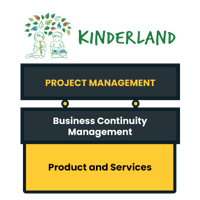 |
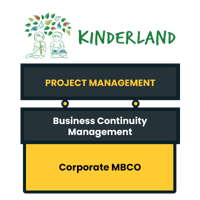 |
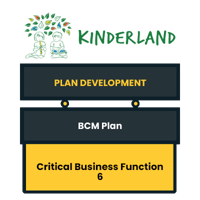 |
 |
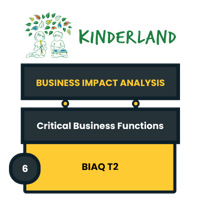 |





![Register [BL-B-3]*](https://blog.bcm-institute.org/hs-fs/hubfs/hub_generated/resized/19a8306f-6b76-45ff-8585-95111f393aeb.png?width=200&height=56&name=19a8306f-6b76-45ff-8585-95111f393aeb.png)



![FAQ [BL-B-3]](https://blog.bcm-institute.org/hs-fs/hubfs/hub_generated/resized/9b7f5669-8ad6-450b-a98f-5f5d49ebfc8e.png?width=150&height=150&name=9b7f5669-8ad6-450b-a98f-5f5d49ebfc8e.png)
![Email to Sales Team [BCM Institute]](https://blog.bcm-institute.org/hs-fs/hubfs/hub_generated/resized/83ae9ad3-affc-416e-8f51-64218d6d98f2.png?width=100&height=100&name=83ae9ad3-affc-416e-8f51-64218d6d98f2.png)





